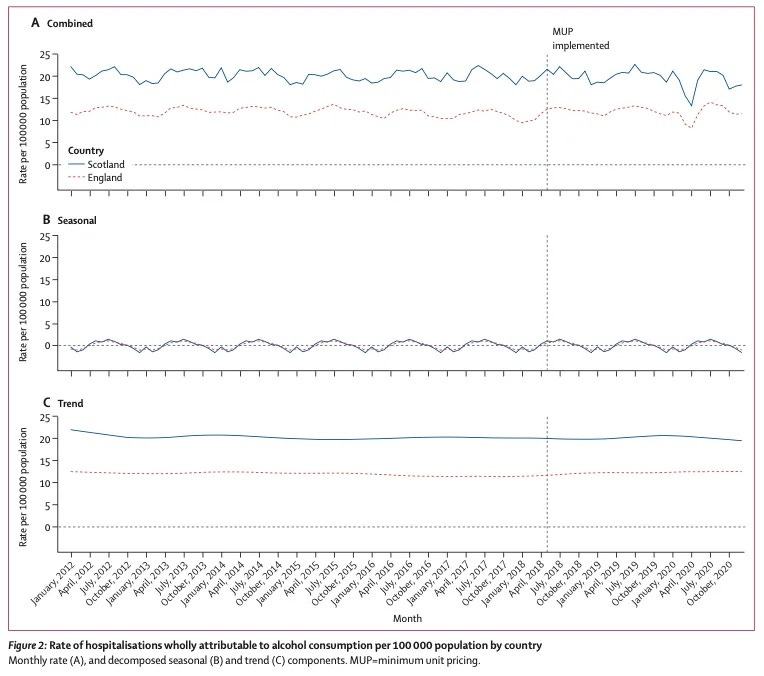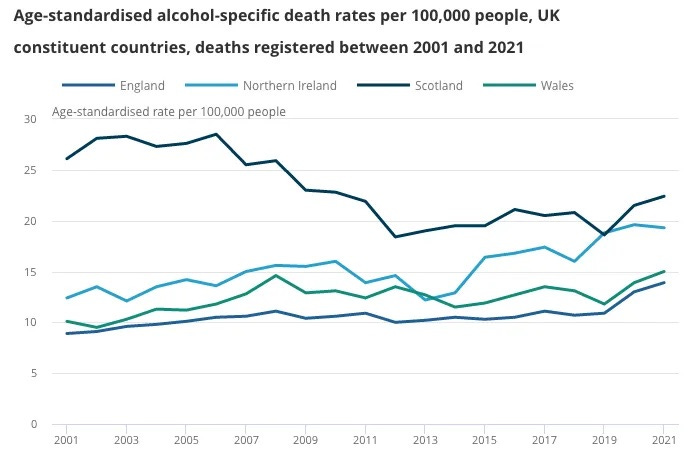As the Scottish government prepares to raise the minimum price for alcohol to 65p, there was one last chance for the reality-based community to point out that the emperor is wearing no clothes. It fell to Conservative MSP Dr Sandesh Gulhane to ask Justina Murray, the CEO of Scottish Families Affected by Alcohol & Drugs, about the claim that minimum pricing had reduced hospital admissions and deaths.
The National covered the story with the headline ‘Tory MSP schooled on minimum unit pricing in clash with charity chief’ and a video of him being ‘schooled’ has gone mildly viral on Twitter.
When Gulhane said the evidence around hospital admissions was not “statistically significant”, Murray responded: “I’m here as a charity CEO, I’m not going to start arguing with you over statistical significance. I think you should be focussing on the fact that MUP has saved lives.”
Nervously smiling, she then said: “I think you’re possibly the only person in the room, I’m not sure, who doesn’t believe the evidence.”
This is pure gaslighting. The National is a risible propaganda rag for the SNP and Scottish Families Affected by Alcohol & Drugs is a state-funded lobby group. The study they are discussing is the only study from the official evaluation that claimed to find a health benefit from minimum pricing. It used a questionable and inherently speculative counterfactual to claim that deaths and hospitalisations were lower than they would have been without the floor price on alcohol. Neither measure actually fell in reality and deaths rose sharply.
The fact that alcohol-related deaths are at a 14 year high in Scotland should be enough to persuade most people that minimum pricing has not been a spectacular success. The implausibility of a reduction in deaths, even relative to a counterfactual, is underlined by every other study looking at health outcomes - A & E attendance, ambulance call outs, heavy drinking, etc. - finding no benefit whatsoever.
The ‘public health’ mob never discuss the rest of the evidence. They focus solely on the modelling study, but even that is underwhelming. You would be hard pushed to spot a decline in alcohol-related hospitalisations from the data shown in that study, except in 2020 when Covid kicked in.
The authors of the study say:
Hospitalisations wholly attributable to alcohol consumption decreased by 4·1% (–8·3 to 0·3; p=0·064).
Even a novice statistician could tell you that a confidence interval that ranges from -8.3 to +0.3 is not statistically significant. Shamefully, the authors never say this explicitly and instead treat it as if it were significant, even going so far as to state that the supposed decline was ‘causally attributed’ to minimum pricing in their conclusion. This tells you a great deal about the authors’ bias and the state of The Lancet these days.
In any case, Gulhane was clearly correct and the woman who ‘schooled’ him doesn’t know what she’s talking about.
Murray hit back at him saying families are “frustrated that this is still being debated so many years down the line”.
She said the public health community is “united” in believing the evidence around the benefits of MUP, saying it had reduced consumption, hospital admissions and deaths.
It’s all a bit North Korean, isn’t it? By any objective measure - such as deaths, shown below - minimum pricing has failed, but the government, its puppet NGOs and its client journalists insist that it has worked - and so it has officially worked. Literary comparisons spring readily to mind - Kafka, Orwell, Alice in Wonderland - but rest assured that it’s not you who’s going mad, it’s Scotland.




We’re living in a post-fact society. Our mistake is to think that by showing them up to be liars, these people will be shamed into changing their behaviour, no, they will just find new ways to censor or punish the honest brokers.
Having said that, thank god for Chris Snowden. When we hear this nonsense it’s great to have an authoritative voice reminding us we’re not actually insane.
Thomas Jefferson famously said:
“No nation is drunken where wine is cheap; and none sober, where the dearness of wine substitutes ardent spirits as the common beverage. It is, in truth, the only antidote to the bane of whiskey.”
One can argue that MUP simply drives heavy drinkers of formerly very cheap beer, wine, and cider to drink more relatively cheap spirits, by narrowing the price gap between beverage types. The Law of Unintended Consequences in action. Tax hikes, on the other hand, would probably not do that, as it would not really narrow the price gap since it would hike prices across the board.